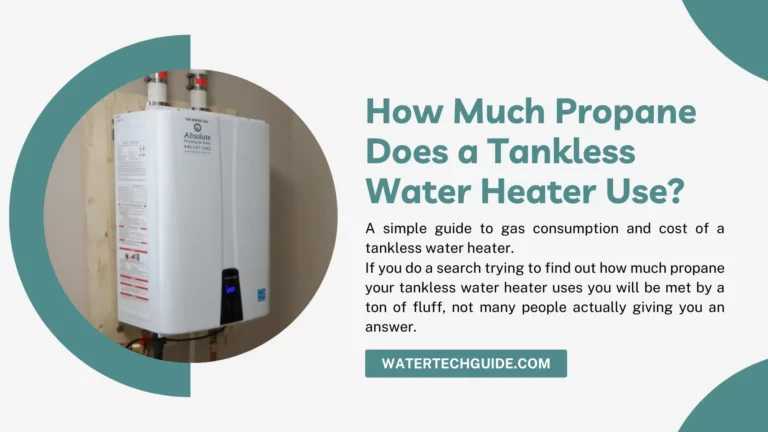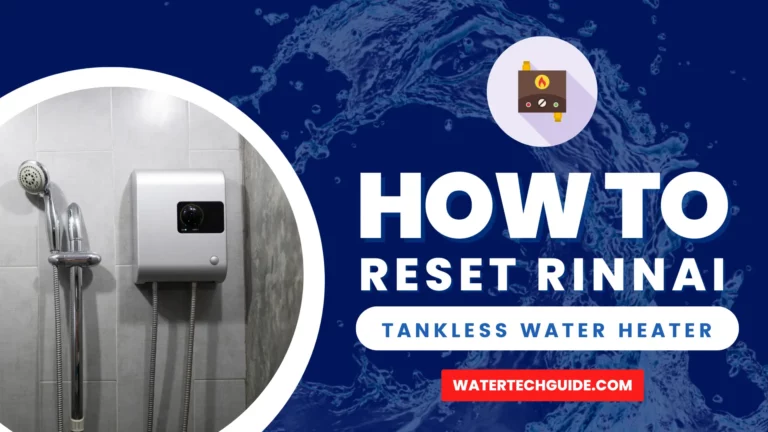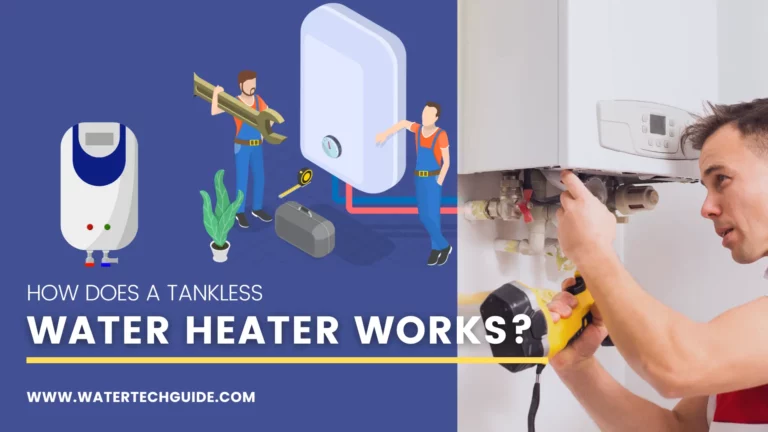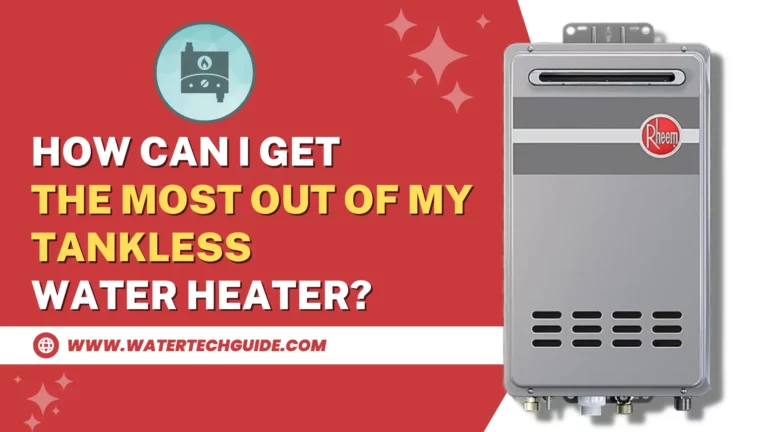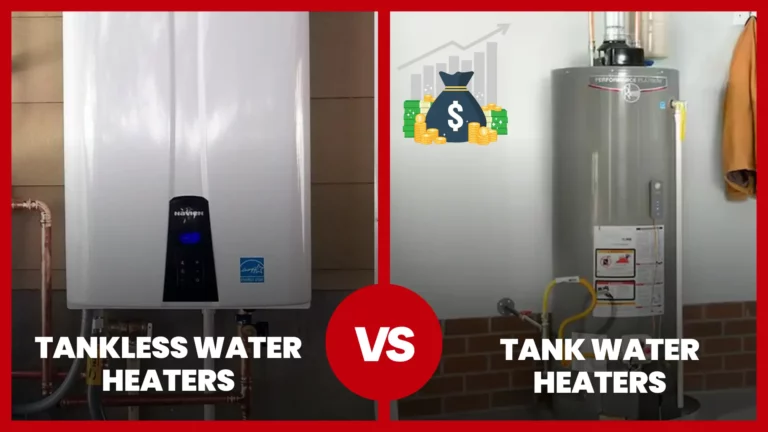Electric vs Gas Water Heater: Which one is Better?
Are you looking to replace or upgrade your water heater, but are unsure which type to choose. You know you don’t want to go for a large cumbersome storage tank system, but you are stuck between a choice of a gas tankless water heater V’s an electric tankless water heater. You are not alone, it is common for so many people to be confused. The reason is there is a whole lot of misinformation about both styles, and much of it is contradictory.
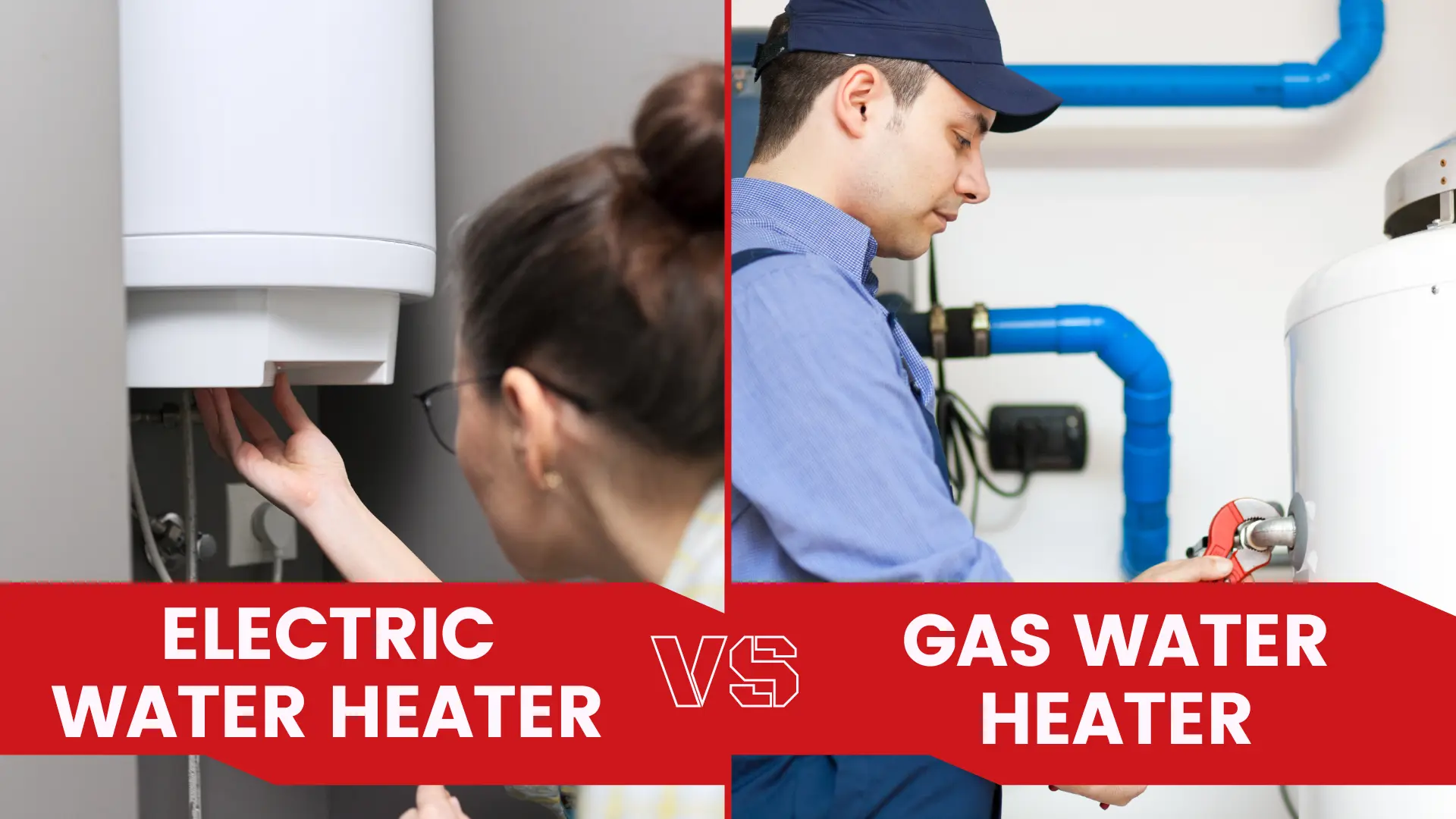
Whichever you do decide to go for you can be assured that there are great options in both electric, and gas-powered water heaters so you will not be choosing an inferior style, just one that is suited best to your circumstances.
And that is the first thing to consider before we get into the pros and cons of each type, you should really just think about your situation. How reliable is your electricity connection? Do you have mains-connected gas to your home? If you are on bottled gas, are you near a reliable propane gas bottle supplier? As the answer to this may determine which direction you will take.
What Is The Difference Between An Electric And Gas Tankless Water Heater?
Besides the obvious, there are a few other big differences between a gas and electric tankless water heater. The most notable difference is in the size but here are a few more things to consider.
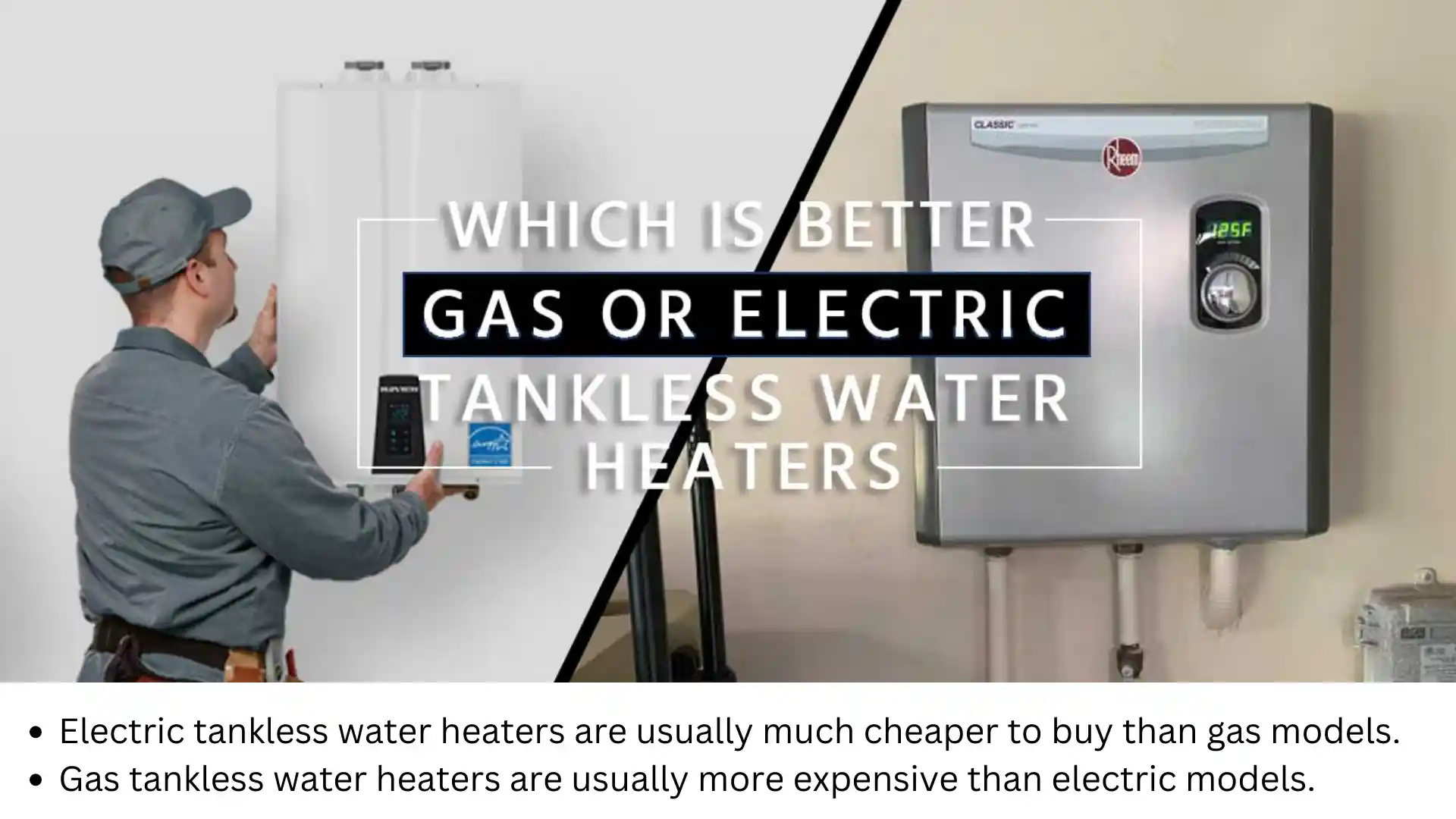
Initial Price
Electric tankless water heaters are usually much cheaper to buy than gas models. That is because they are far less complex, they are basically just a glorified kettle that plumbs into your water supply.
Gas tankless water heaters are usually more expensive than electric models, but the high-cost electricity compared to gas in most areas usually makes gas much cheaper to run, making them cheaper over the long term.
Installation Requirements
Another benefit of an electric tankless water heater is that they tend to be smaller in size than gas models – making them easier to install without having too many problems with clearance or space requirements. Electric water heaters don’t produce any harmful emissions, so you can have them installed pretty much anywhere indoors Electric water heaters are a better choice if you need to install your heater indoors because they don’t produce any emissions and have no ventilation requirements.
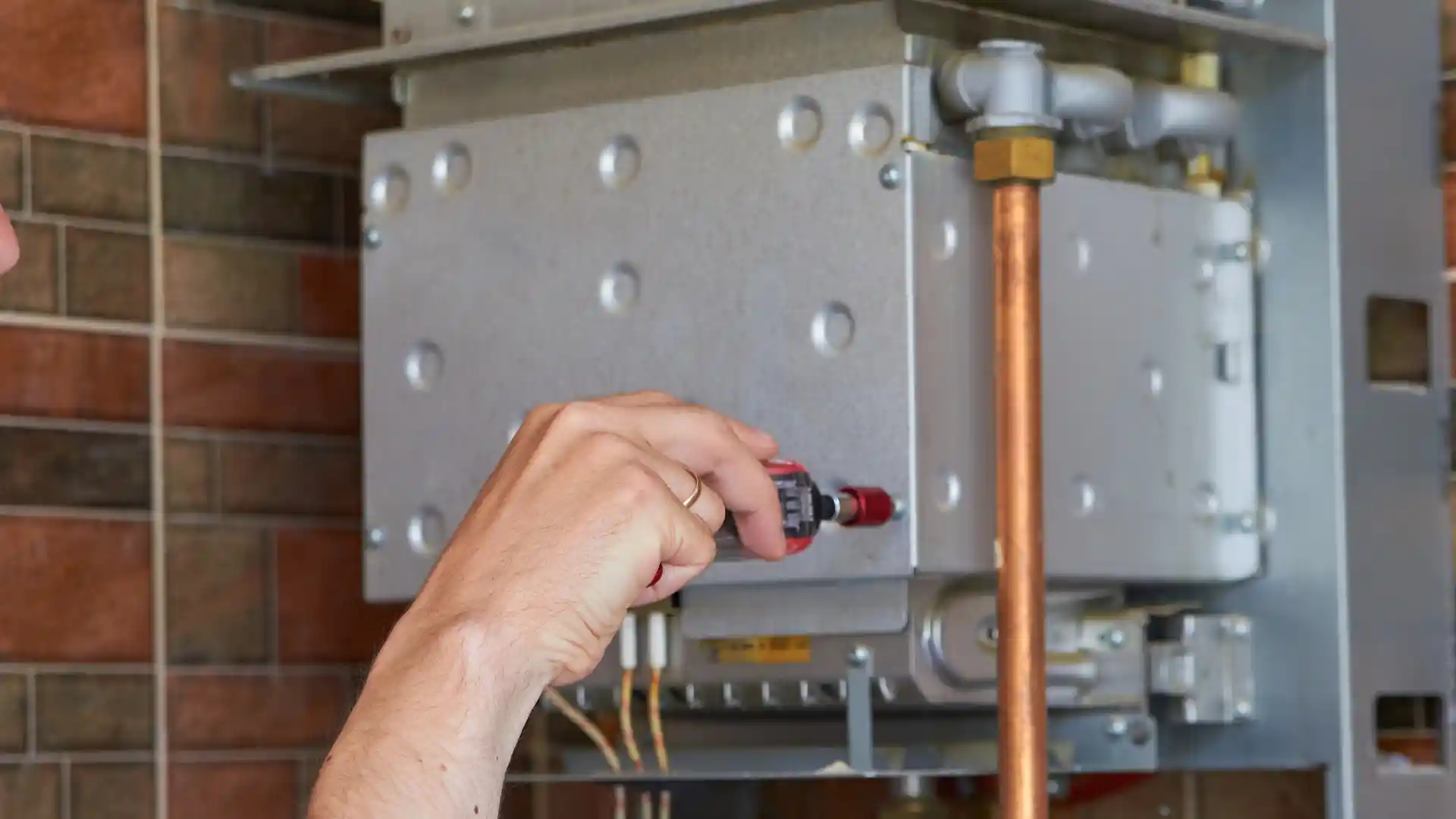
The lack of ventilation requirements also means that the install cost of an electric water heater is significantly lower than a gas water heater.
Gas water heaters on the other hand do produce emissions, and although most modern tankless water heaters produce very little emissions they will, for the most part, need to be installed externally, or in an area that is well ventilated and with an exhaust vent/flu.
Maintenance Requirements and Cost
Once installed, electric, and gas tankless water heaters won’t cost you a great deal, besides what you are consuming in gas and electricity of course. However, both electric and gas tankless water heaters will require some ongoing maintenance if you want them to last a long time into the future.
It is recommended to have a gas unit serviced once every year or two though, just to ensure they last a long time, and that they are running at their optimum efficiency.
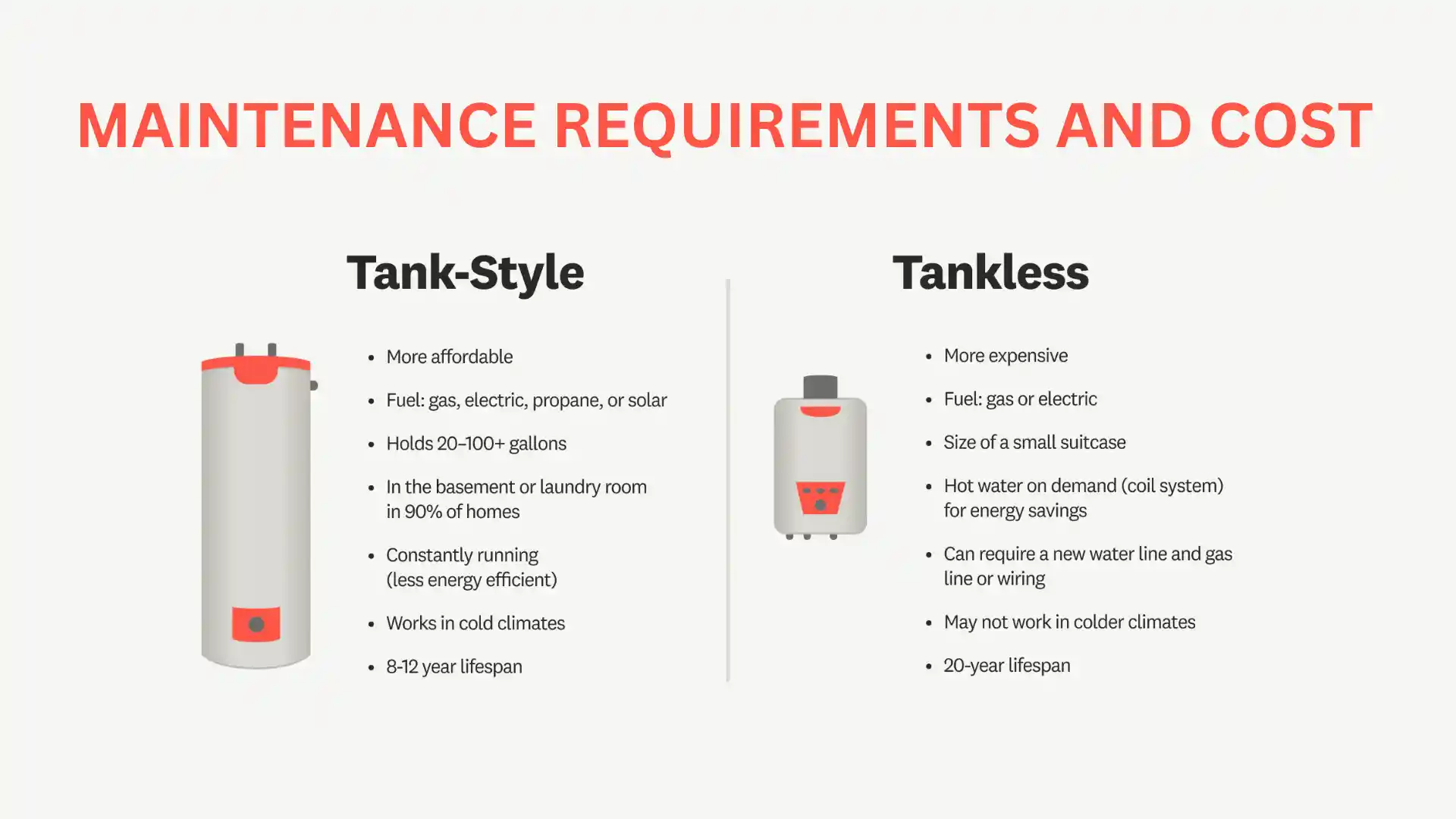
Gas tankless water heaters should really be flushed once a year, especially if you have hard water. This is not a big job and can be done with a few basic items. If you want to know more, go check out our guide on how to flush a tankless water heater. Electric systems are less complex internally and are not usually required to be flushed as regularly, although they will benefit from the occasional clean out, to remove internal limescale build-up.
Most Gas Tankless water heaters will also have a digital display, that will show you if there are any issues with your water heater, this makes diagnosing issues very easy. And once diagnosed and repaired you can easily reset your system.
Operating Expenses For Tankless Water Heaters
This is where there can be a big difference from one model to another. And it can be a little more complicated to figure out the ongoing cost. That is because gas water heater use is measured in Btu (British Thermal Units) and usually billed in Thermal units 1Therm = 100,000 Btu
Whereas electric water heaters are measured in kW(Kilowatts) and you are billed by energy used per hour.
We ran an example through a calculator using an average water consumption of 64 Gallons per day electricity cost of $0.13 per Kw and a natural gas cost of $0.95 per Therm
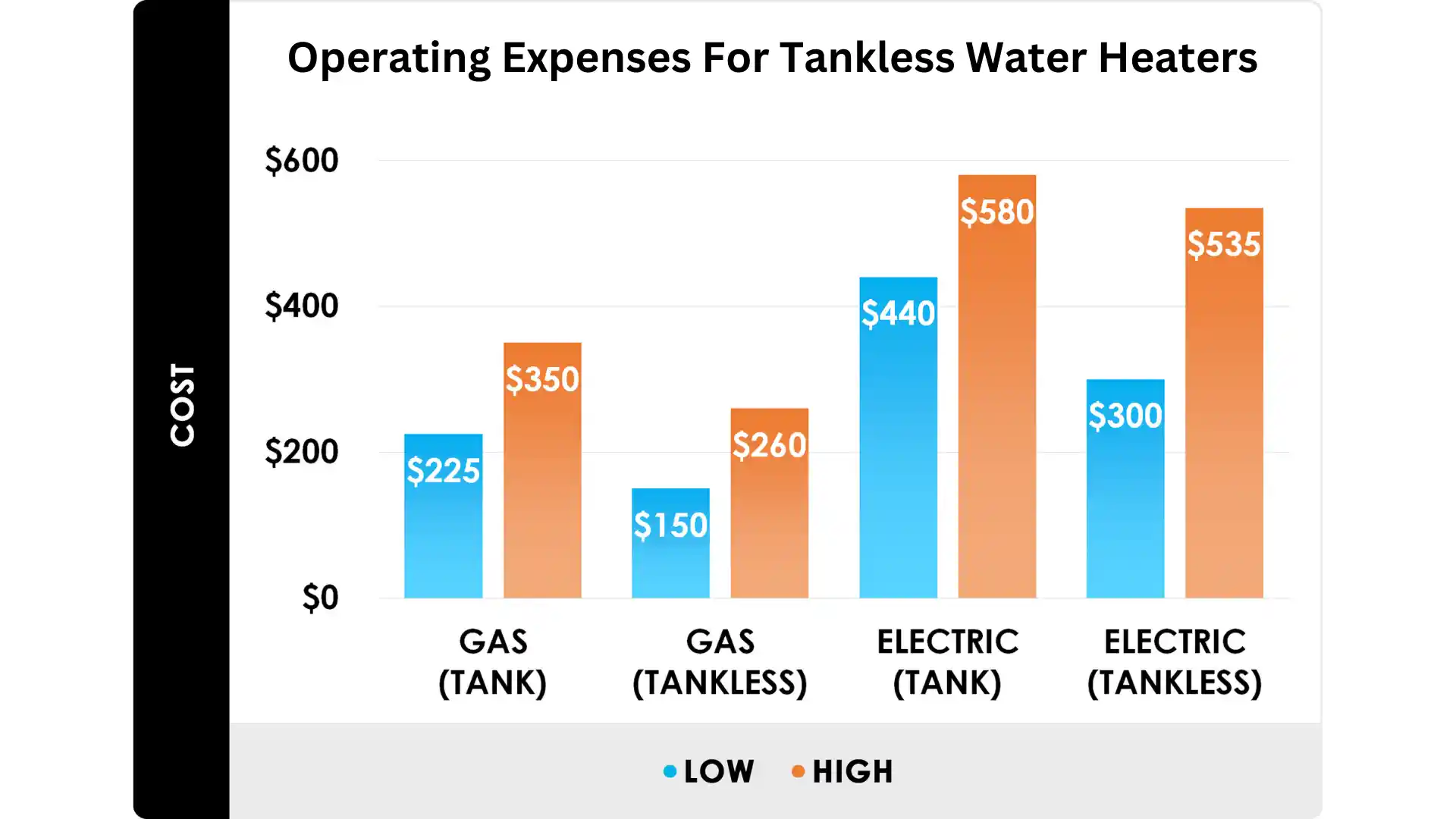
The results show that a high-efficiency electric water heater such as the Steibel Eltron DHCE will cost you around $620 per year to run.
Whereas a comparable natural gas water heater such as the Rinnai V65iN would only cost around $170.
So as you can see a gas water heater is a clear winner if you want to save on your energy bills!
This is why if you have access to natural gas it is rarely recommended to use an electric instant water heater unless you also have a large Sola PV system or another alternative power source.
https://www.energy.gov/eere/femp/energy-cost-calculator-electric-and-gas-water-heaters#output
https://energyusecalculator.com/electricity_waterheater.htm
Individual Preference
Gas water heaters are more common, but electric water heaters are on the rise. Electric water heaters are also very energy efficient and considered more environmentally friendly as they don’t burn fossil fuels. This may be something that you are concerned about when choosing your water heater. But it is more than likely that your electricity comes from fossil fuels and not renewable sources anyway, so this may not be a huge consideration.
Fuel Source Considerations
Electric water heaters are currently more expensive than gas to run. In the near future, however, electricity may become more affordable compared to gas. We have seen gas prices increase dramatically worldwide due to supply and demand. And as more renewable energy power stations are built, electricity costs will hopefully remain more stable.
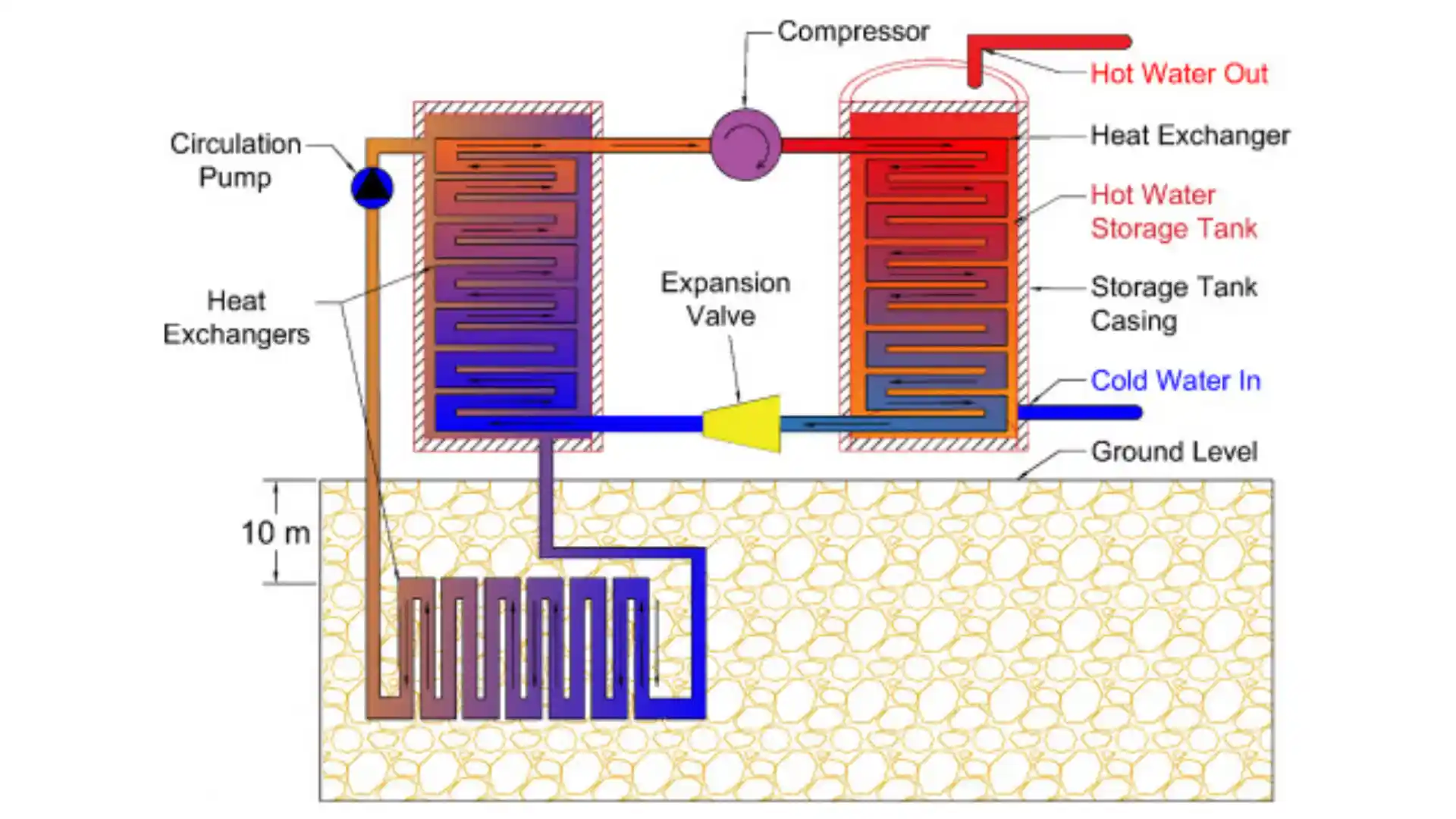
But for now, gas, even bottled propane is a far cheaper power source for your water heater.
Gas Tankless Water Heater Advantages vs Disadvantages
Advantage #1 Higher Flowrate
Gas tankless water heaters are more suitable for large homes than electric because they have a higher maximum flow rate. So they can supply hot water to multiple locations at once, without a noticeable drop in water pressure. A large unit such as the RInnai RUR199 propane or natural gas models can provide enough hot water to service up to 6 different areas at one time.
Advantage #2 Their Energy Costs Are Much Lower
We have already touched on how much cheaper gas water heaters are to run than their electric counterparts. The cost-saving over a lifetime of the unit is quite staggering though. Take the example we used before, over the 20 year life of the heaters the cost saving of gas would be around $6,000.
Disadvantage #1 A Good Gas Tankless Water Heater Is Quite Expensive To Purchase.
There are cheap models available but if you want an efficient long-lasting gas tankless water heater you can expect to pay between $800 – $2,000.
Disadvantage #2 Installation Can Be Complicated And Costly.
Some water heater brands require a licensed HVAC technician to do the install or your warranty will be void. And depending on what you are going to install your water heater you may require additional ventilation and piping to ensure exhaust fumes are vented out of the home. This can add an additional cost that you would not have for an electric unit.
Disadvantage #3:It Is Important To Properly Vent Exhaust Gasses
Gas exhaust can build up and be a real health hazard if you have not installed the correct venting. If you are replacing an existing gas unit with a new one, be sure to check the venting requirements as they may not be the same. For example, high-efficiency condensing units usually require specific stainless steel pipes, which are not cheap, expect to pay a couple of hundred dollars for them alone.
Most modern gas water heaters also have gas exhaust detection, so if the flu is not installed properly the unit may give you an error and stop working altogether.
Lastly, if you have never had a vented system then you may need to cut holes in the wall or roof for the ventilation pipes to go through.
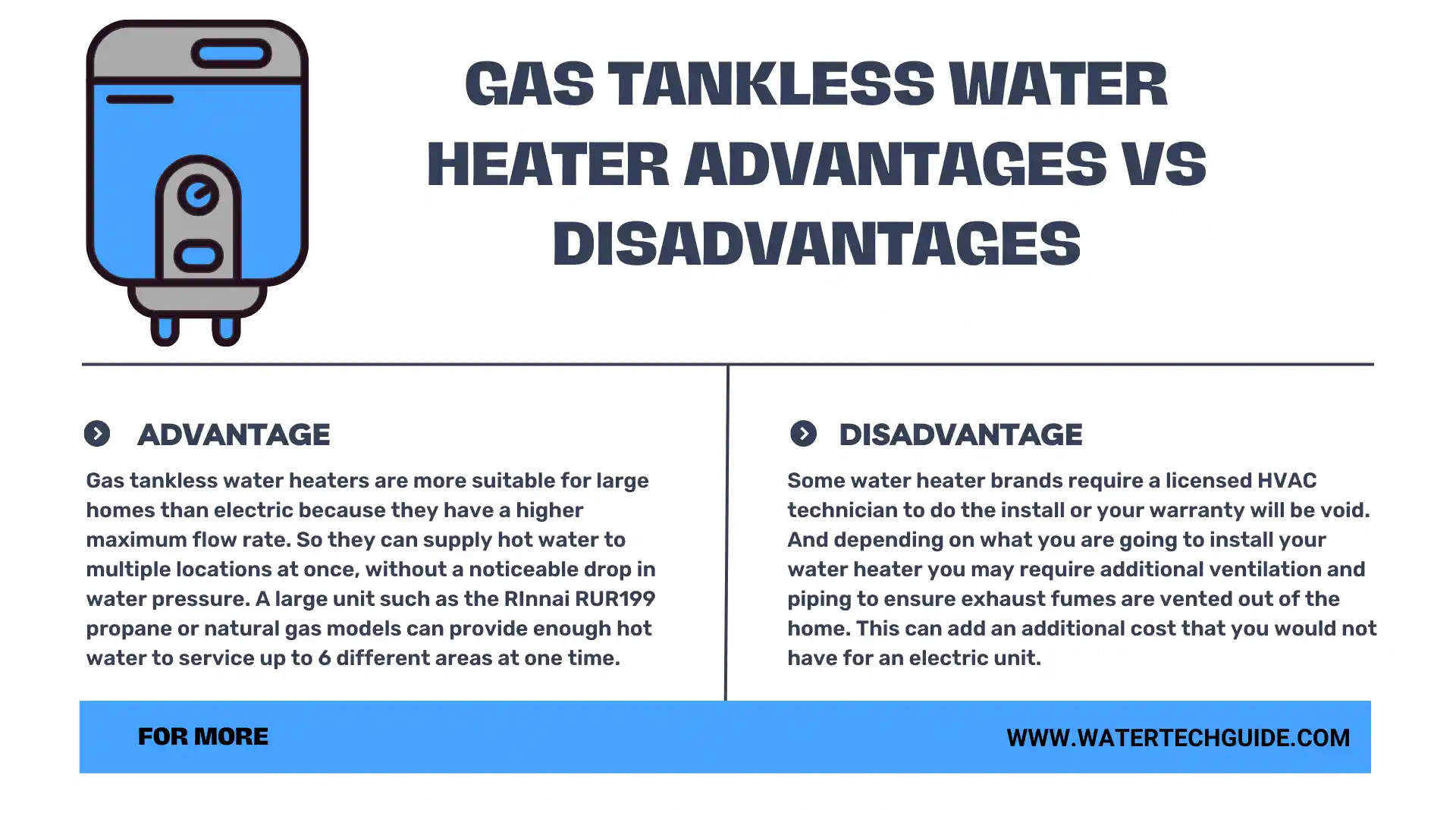
Disadvantage #4 Gas Heaters Have Some Risks And Yearly Maintenance
Whenever you have a gas appliance there is always a risk of the gas leaking out. This is why you should always use a licensed technician, and have your unit serviced every year to check for potential leaks and to service the heat exchanger.
Disadvantage #5 If You Run Out of Gas, You Run Out Of Hot Water
For those who have natural gas plumbed to the home, this is not an issue. But if you are running on bottled propane, there will undoubtedly be a time where you forget to replace the bottle and will be midway through a shower when you are suddenly standing in a stream of freezing cold water, not a great way to start the day unless you are a devotee of the Whim Hoff method, his book is a great read actually.
Summing Up Gas Tankless Water Heaters
There are a few things to look out for when installing a gas water heater, and they are more expensive to buy. But if you can afford the initial purchase price, they are still a far more economical and reliable choice.
Best Tankless Gas Water Heaters
Premium Choice
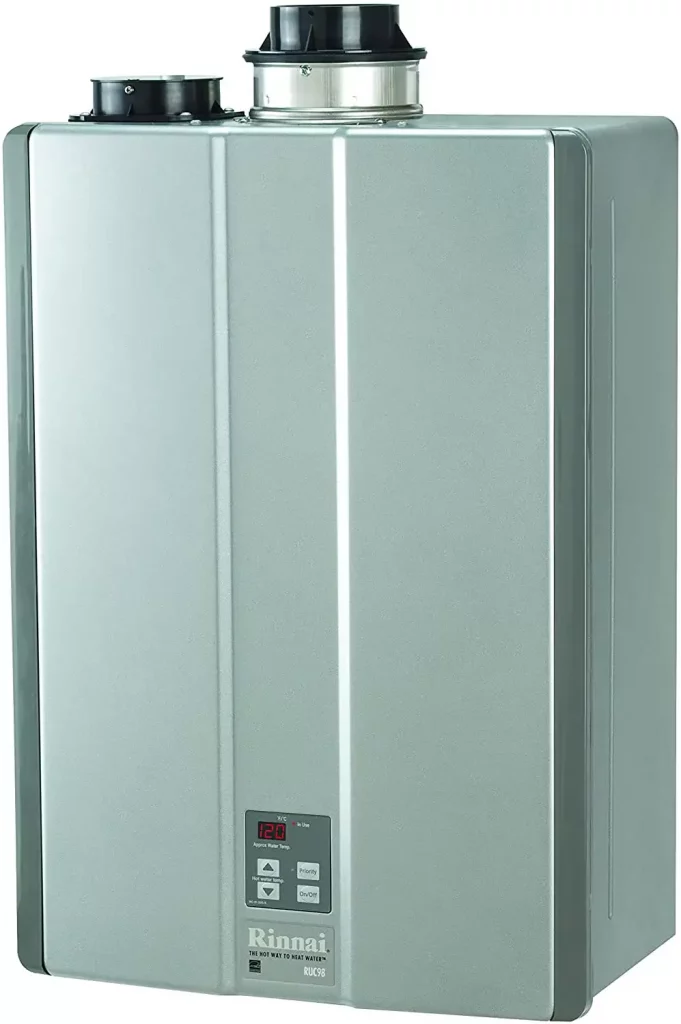
Rinnai RUC98IN
High Efficiency Natural Gas Water Heater
About this item
- 9.8 GPM
- 0.95 Energy Factor Rating
- Gas, Indoor
- Easy To Install
Premium Choice
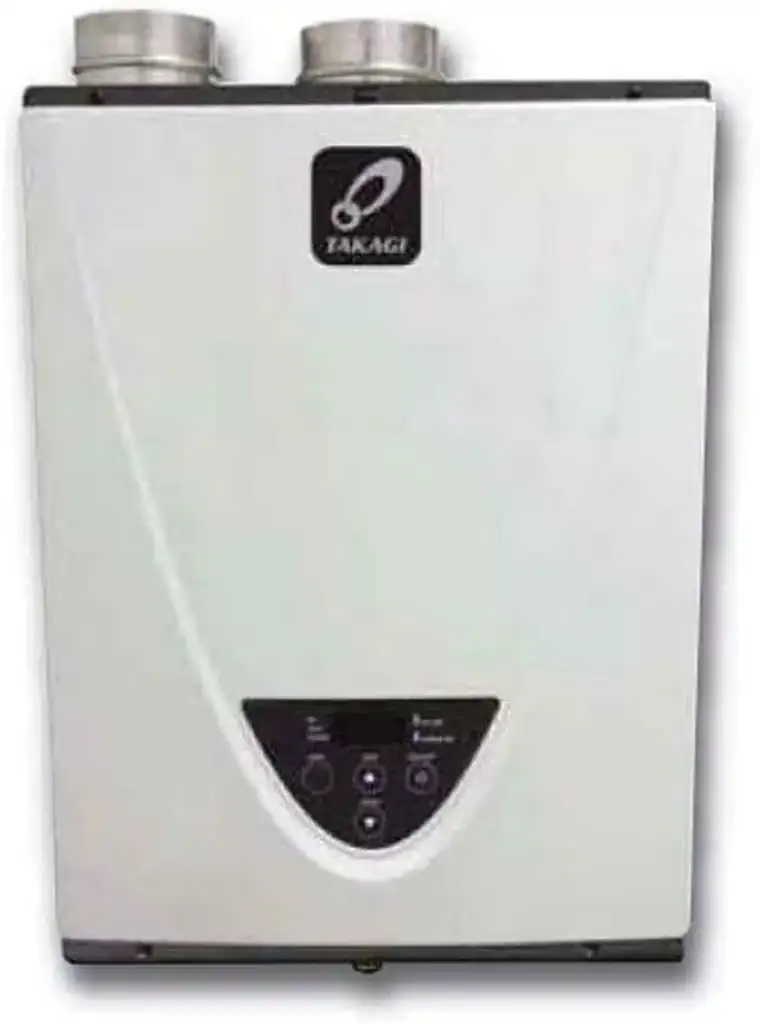
Takagi T-H3-DV-N
Computerized Safety Features, No Pilot Light to Have to Worry About
About this item
- 6.6 Max GPM
- 83% Efficiency Rating
- Easy to install
- Suitable for Whole House, Indoor
Best Overall
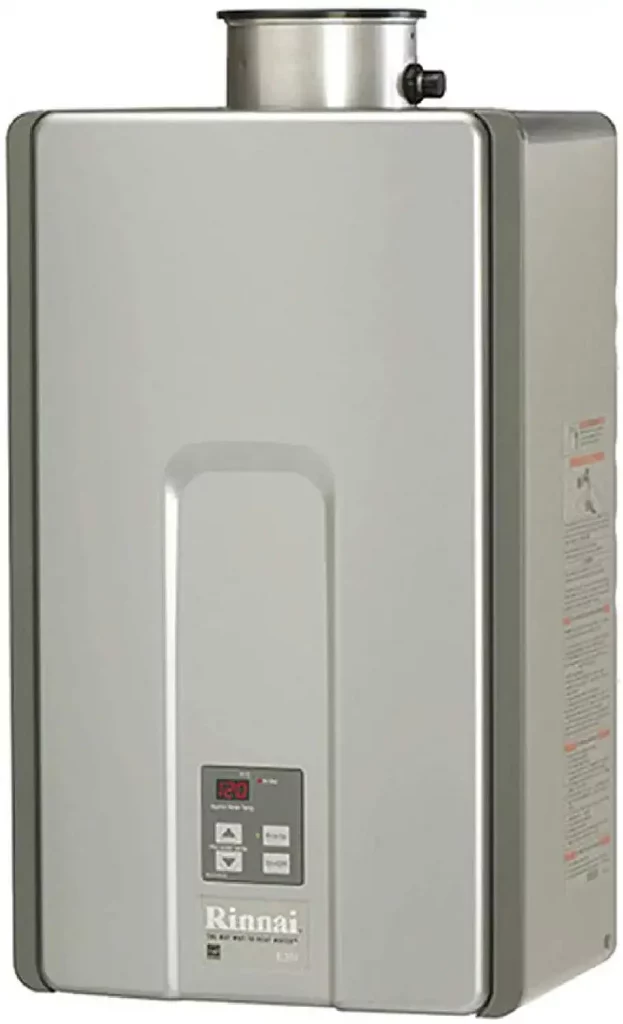
Rinnai RL94IN
The RL94in Is the Perfect Combination of High Efficiency, Comfort, and Valuable Heater.
About this item
- 9.4 GPM
- Easy to install
- 0.82 Energy Factor Rating
- Gas, Outdoor
Electric Tankless Water Heater Advantages Vs Disadvantages
Advantage #1 Cheap To Buy
The initial investment of an electric tankless water heater is much lower than that of a gas unit a good electric instantaneous water heater will cost as little as $200. But expect to pay closer to $600 if you have a larger house. This is still considerably less than a comparable gas water heater.
Advantage #2 Easy Installation
Instant electric water heaters are usually very easy to install and can be installed outdoors or indoors and are easier for plumbing professionals because they don’t require the installation ventilation.
Advantage #3 Meet Any Space Requirements
Because of the compact size and no need for ventilation, you can install an electric water heater just about anywhere. Many people will choose to install their heaters in discrete locations such as under the sink or in the basement.
Advantage #4 Minimal Ongoing Maintenance
Unlike gas water heaters electric do not require as much regular maintenance, as there is no risk of gas leaks and their simple design makes them less prone to issues.
Advantage #5 You’re Reducing Your Carbon Footprint
Okay so technically this may or may not be true. It will depend on how your electricity is created, if your power comes from a gas or coal-fired turbine then you are not really lowering any emissions. But as more and more power production comes from renewable and clean energy this will be something to consider.
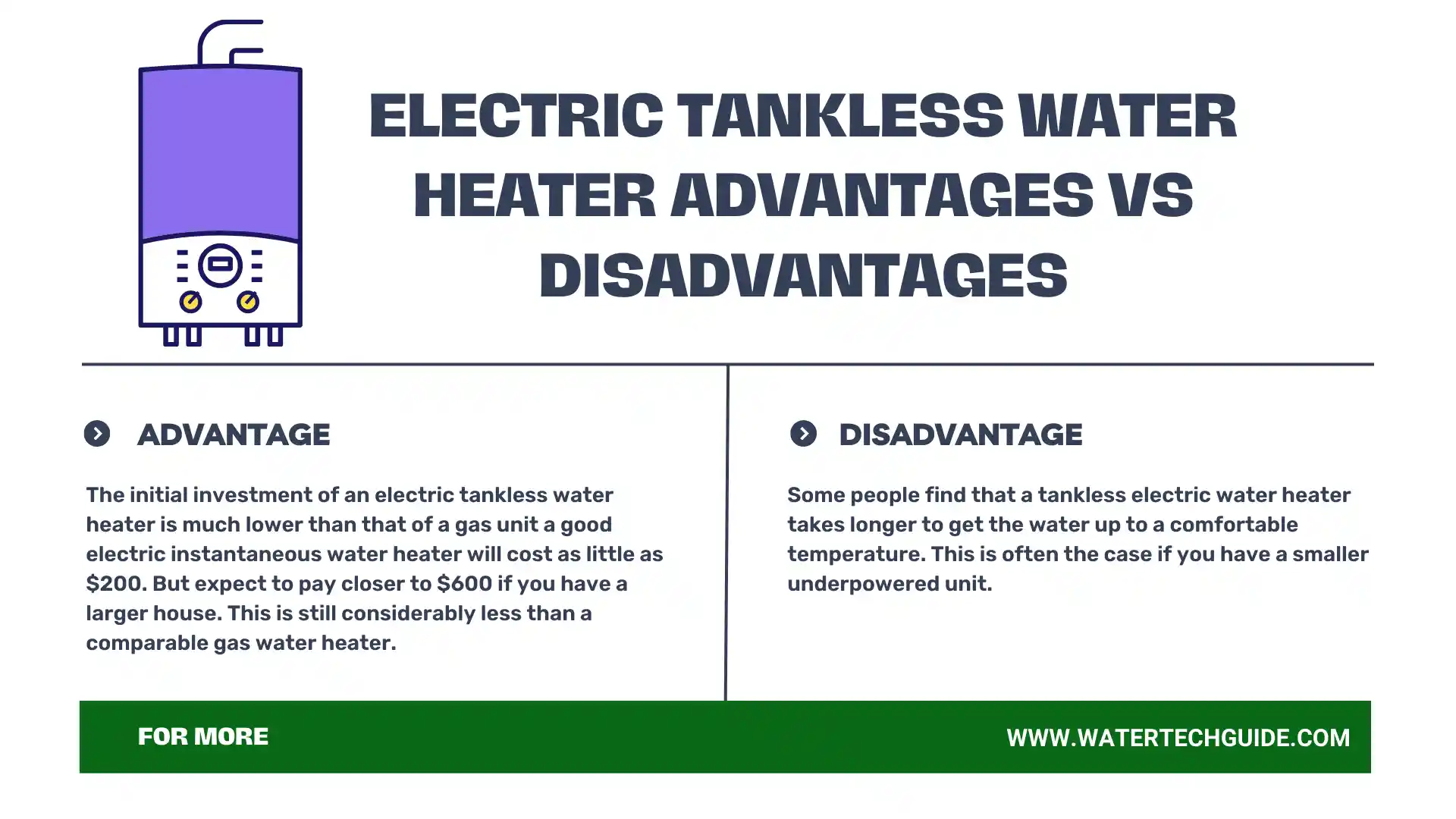
Disadvantage #1 You Will Use Lots More Electricity
If you decide to go for an electric water heater, be prepared to use a whole lot more electricity, and this will directly affect your monthly utility bills.
Electric water heaters use lots more electricity than gas ones do, and that will mean much higher monthly energy costs unless you have some way to offset the usage such as a large solar power system and battery storage for when you are using the hot water at night or on cloudy days.
Disadvantage #2 Slow Heat Up Time
Some people find that a tankless electric water heater takes longer to get the water up to a comfortable temperature. This is often the case if you have a smaller underpowered unit.
Disadvantage #3 Struggles To Cope With Multiple Outlets
Gas water heaters are far better than electric instant when it comes to servicing a large home with a need to have multiple areas using hot water at the same time. Because electric water heaters are limited to the maximum voltage and amps supplied by main power connections. So unless you have a three-phase connection and the budget for a large commercial electric boiler, electricity just can’t cope with high water flow demands.
Summing Up Gas Tankless Water Heaters
Even though they are expensive to run, there are many benefits to using an electric tankless water heater. One is that it doesn’t produce fumes or noise, which can be a big problem for people who live in apartments. they are super compact and cheap to buy.
The Best Electric Tankless Water Heaters
We have reviewed a number of electric water heaters, click this link if you are looking for a review of the cheapest quality water heaters or we have reviewed some great models in the best cheap tankless list too.
Premium Choice
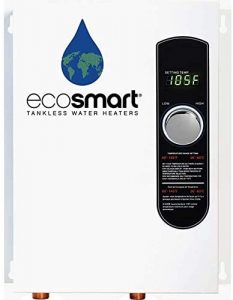
ECOSmart ECO 18
18 KW at 240 Volts with Patented Self Modulating Technology
About this item
- 8.8 GPM
- 0.95 Energy Factor Rating
- Electric, Indoor
Best Overall
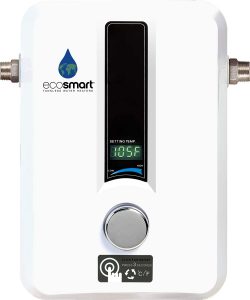
EcoSmart ECO 11
13KW at 240 Volts with Patented Self Modulating Technology
About this item
- 3.2 GPM
- 0.98 Energy Factor Rating
- Electric, Indoor
Budget Pick
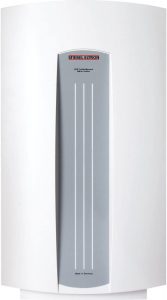
Stiebel Eltron DHC
4-3 Point of Use
Tankless Electric Water Heater, 277-volt
About this item
- 1.2 GPM
- Electric , Whole House
- 0.94 Energy Factor Rating
Other Types Of Water Heaters To Consider
Electric and gas water heaters both have their pros and cons. They are not the only options for a hot water heater; there are other types of water heaters as well, such as slow combustion wood water heaters, solar and heat pumps. I won’t go into too much detail here, but these types of water heaters also have specific uses and can be an option worth considering.
Heat Pump Water Heaters
What is an Air-Source Heat Pump? Air-source heat pumps absorb warmth from the air around and inside the unit and transfer it to heat water, using the electric elements only as a backup when needed.
Because of their minimal electricity usage, they are also typically referred to as air-source heat pumps. They typically operate more efficiently than a conventional electric water heater saving up to 3x the power of a conventional water heater.
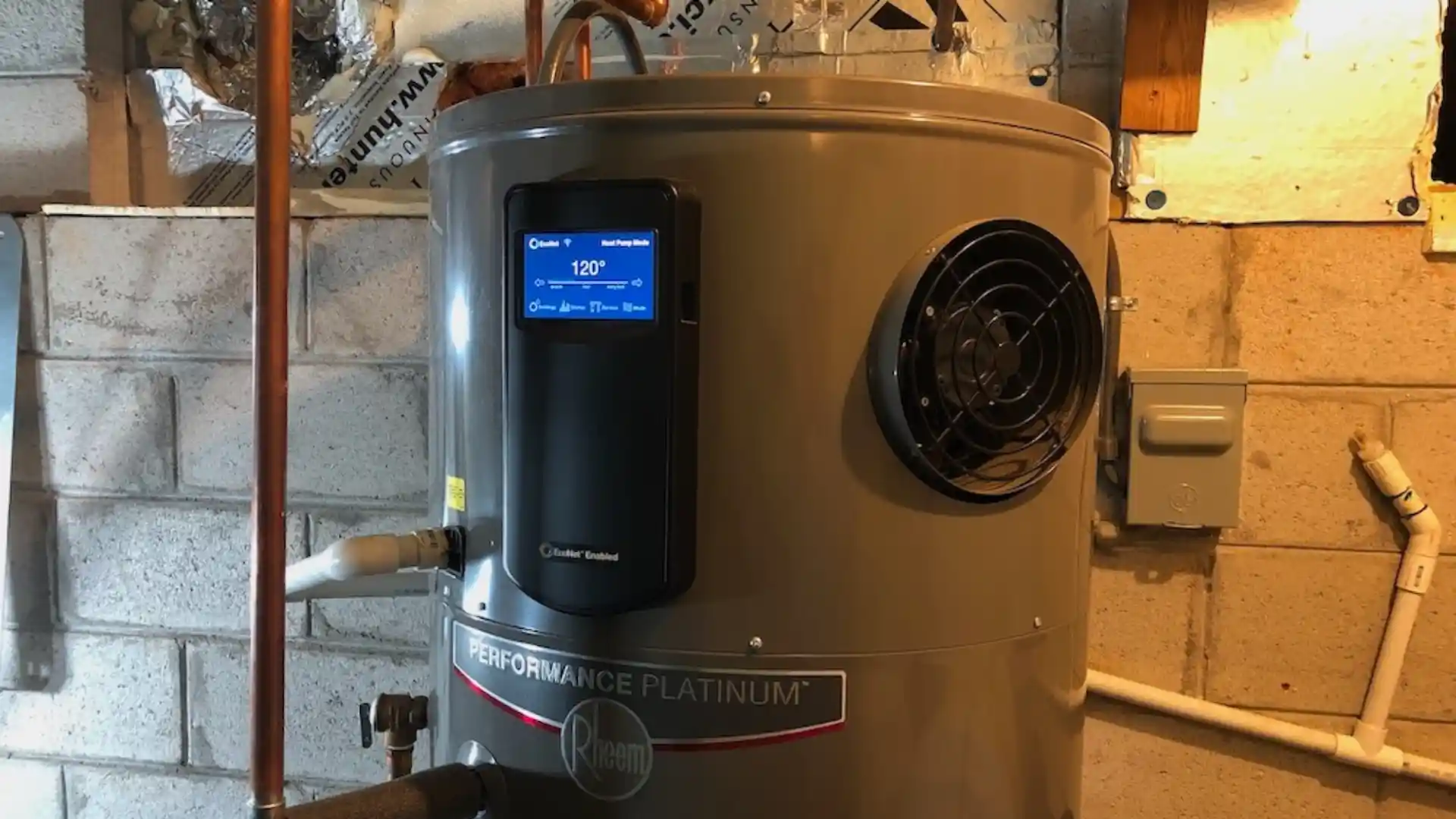
They are often coupled with solar water heating tubes too.
The downside, they are very expensive and cumbersome.
Solar Water Heaters
Solar water heaters have come a long way over the last decade. I remember dreading having a shower at friends’ houses who had solar water, it was inevitable that there was not going to be enough hot water and I would be stuck having an, at best lukewarm shower.
The best solar water heaters now use evacuated vacuum tubes, which can reach staggering internal temperatures! they are so efficient that a small set of 12 or so tubes is usually plenty to supply an entire house.
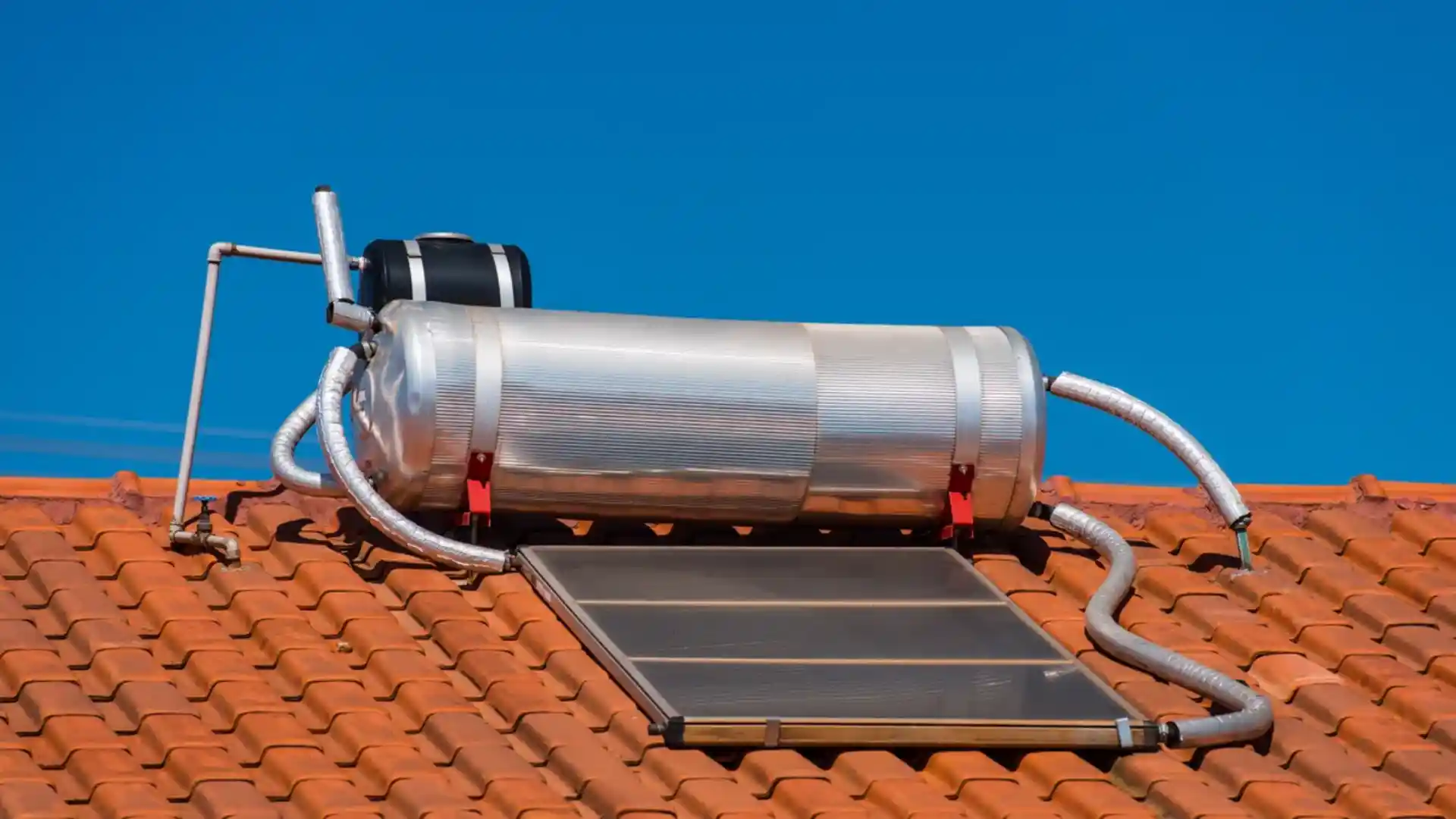
IF you have hard water, be careful, the high internal temperatures mean that they will suffer from limescale build-up very quickly, and then they become far less efficient. So my advice, if you are thinking of using vacuum tubes, install a whole house filter and water softener like the iSpring WGB32B first. Otherwise, you will be calling out a plumber to flush them with acetic acid regularly.
Wet Back Wood Water Heaters
Serving 2 purposes a slow combustion wood heater with a wet back is great if you are in a climate where you are likely to need the heating on for most of the year, and you have access to plenty of firewood. Wet back heaters are the ideal option for off-grid too, they will work even when power is not available.
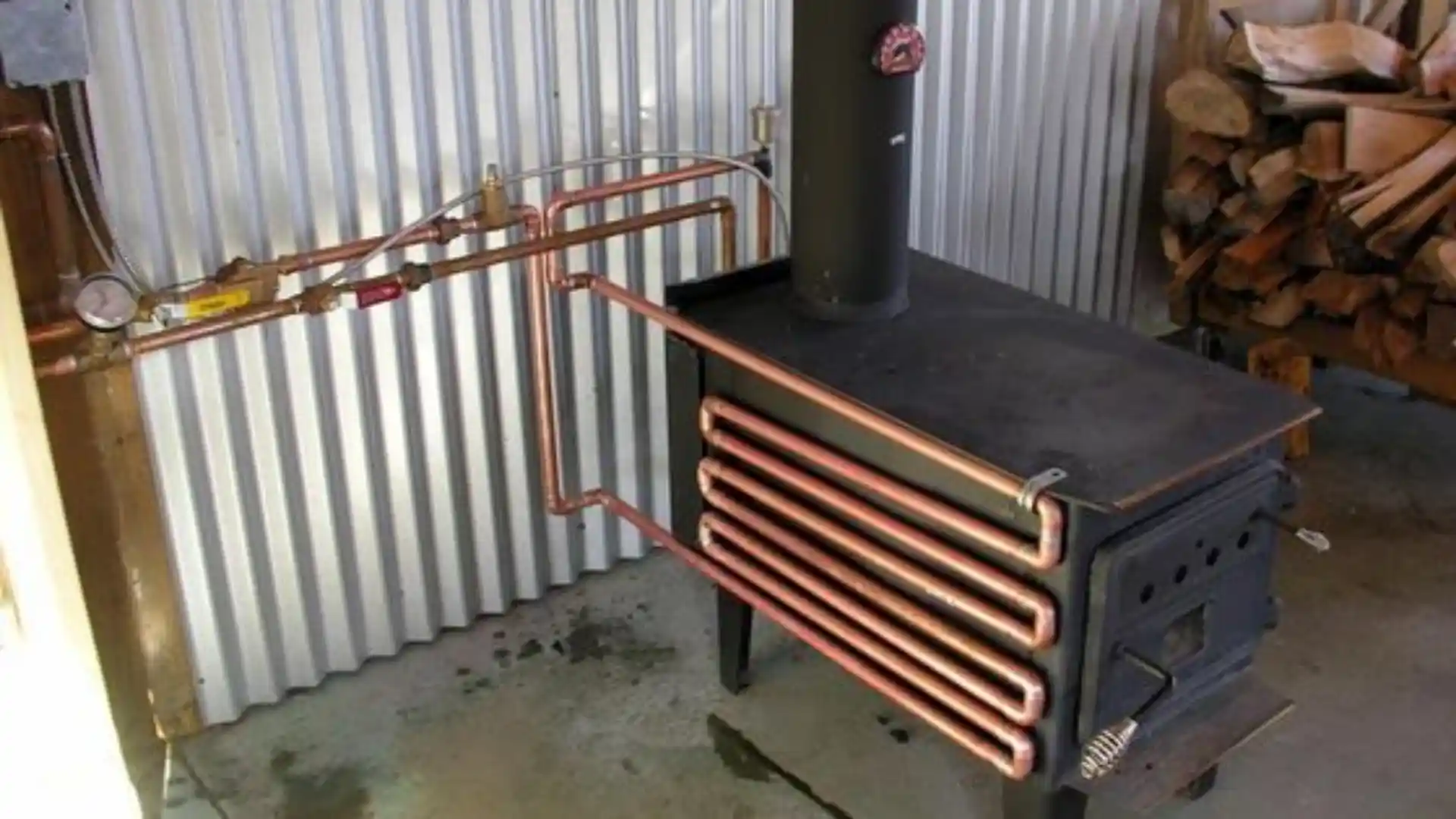
Some are combined with an oven, taking care of three problems in one. And ff you have access to wood they are pretty much free to run, besides a little muscle power and maybe some fuel for the chainsaw. The downside is they are typically large, heavy, and can be costly to buy, plus if you are in a warm climate you do not want a cozy fire burning inside your home year-round.
Most people who have a wetback water heater, have a backup water heater inline too so they can have the benefits of whichever is best at the time.
FAQ’s
Can A Tankless Water Heater Run Off A Generator?
Gas tankless water heaters might run off a generator, but you will need to have a large diesel-powered generator in order for the system to function properly. Most electric water heaters draw around 150amps or more and a typical small generator is only going to deliver 10-15amps and around 2.5KVA to 3.5KVA. If electricity is unreliable where you are then it is better to choose a gas water heater.
Are Tankless Water Heaters A Lot Of Maintenance?
Tankless water heaters, either electric instant or gas tankless are less maintenance than traditional storage tank heaters. They do not require heating anodes to be replaced and are not holding standing water so are less susceptible to corrosion. You should still flush your system from time to time though.
Do Tankless Water Heaters Use Less Energy?
Yes, both gas and electric tankless water heaters are more efficient than storage tank water heaters.
Do Tankless Water Heaters Use More Electricity Than Regular Water Heaters?
Tankless water heaters only use large amounts of electricity when they are in use, so they are far more efficient than a storage hot water system.
